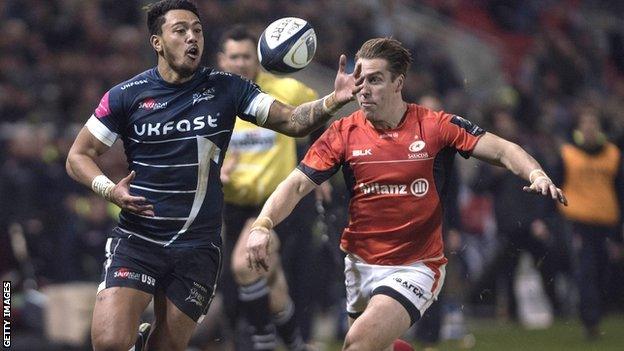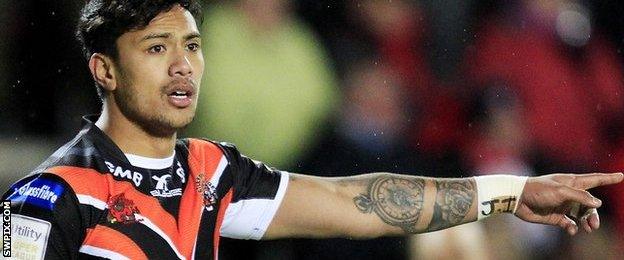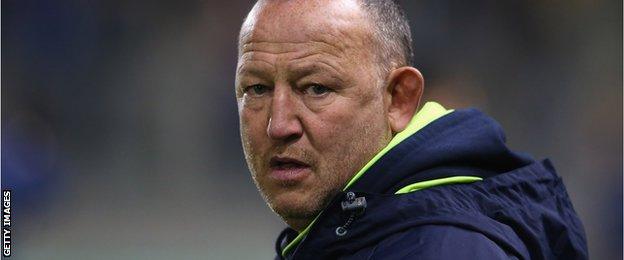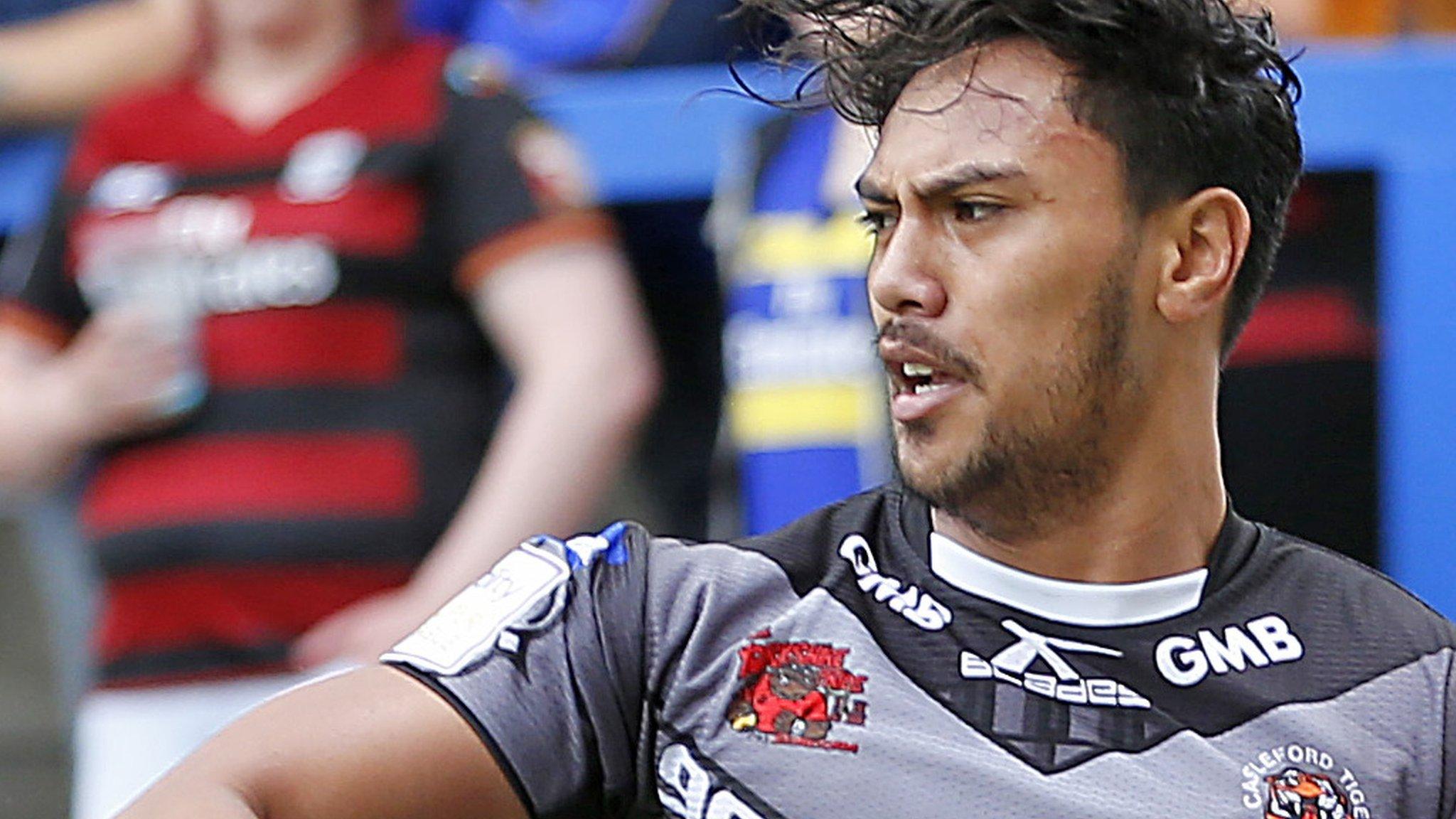Denny Solomona: The legal case that could impact rugby as Bosman did football
- Published

Denny Solomona (left) in action against Saracens on his Sale Sharks debut
The legal battle over Denny Solomona's contract could impact both rugby codes in a way the Bosman ruling affected football, according to a prominent sports lawyer.
Despite having two years remaining on his contract with Super League club Castleford Tigers, Solomona retired from rugby league and subsequently joined Premiership rugby union side Sale Sharks on a three-year deal.
On Sunday, the 23-year-old made his debut in Sale's 24-10 European Champions Cup defeat by Saracens.
Castleford are taking legal action "as a last resort", with the Tigers suing for damages against Sale, Solomona and Andy Clarke - his agent - at the High Court in Leeds.
The case, Tigers chairman Steve Gill said, is "for the integrity of all sports, including, of course, rugby union clubs".
"It may lead to something that has an effect like Bosman - it has the potential to be like that," said David Seligman, a sports lawyer at CM Solicitors, who also works as a football agent.
Former footballer Jean-Marc Bosman famously took his own case to the European courts and, in December 1995, won - setting a precedent allowing footballers to leave their club for no transfer fee once their contract had expired.
As the Solomona dispute has exposed legal and financial issues, a number of experts have spoken to BBC Sport about:
The "Pandora's box" that has been opened
How the case has dredged up more than a century of resentment between the rugby codes
The need to close "loop holes" between the sports
'Mutual incomprehension'

Denny Solomona scored 42 tries during the 2016 season
The legal battle for Solomona has been more than 120 years in the making, according to professor Tony Collins, a world leader in both rugby codes from the International Centre for Sports History and Culture at De Montfort University.
"The case throws up a huge amount of issues that have either been under the surface in both games or ones that are inevitably going to arise as rugby becomes more commercialised and professionalised," he told BBC Sport.
"One problem in dealing with issues like this is that there is well over a century of, at times, hostility, sometimes distrust and always a mutual incomprehension."
Rugby Football League chief executive Nigel Wood has said he is worried about the "implications for the game" as the "sanctity of contracts need to be respected".
And, while a Rugby Football Union spokesman said they respect those concerns, they did not stop the move as it relates to Solomona's employment status in a different sport.
Solomona retired from one sport, only to start a career in another - breaking his contract with Castleford and leaving them with his registration as a rugby league player, but free to cross codes.
"Rather than rolling over and doing nothing, they have fought it," Seligman told BBC Sport.
"They have had to instruct a QC because there is no easy path to take, there is nowhere to turn to, no single body, which is unfair really."
Uncharted waters for Sharks and Tigers

Steve Diamond made Solomona Sale's second rugby league addition this season, having already signed Josh Charnley from Wigan
Castleford chairman Gill said that Sale were "repeatedly" told that they did not have permission to approach Solomona about a move to rugby union.
Tigers are now seeking damages against the player for breach of contract and for damages, including exemplary damages, against Sale Sharks and agent Clarke for "inducing" Solomona to breach his contract.
Sale director of rugby Steve Diamond has said he does not think that the Premiership club have done anything wrong, and hopes the case can be settled without a legal battle.
He is also intent on trying to downplay it as a clash of rugby codes.
Talking to BBC Radio Manchester's Rugby Union Extra, Diamond said: "I've no experience of situations like this but we believe it could still be settled out of court.
"Let's move away from the fact it is rugby union-rugby league at each other. It's not. It is a contractual issue that will get sorted one way or another.
"Castleford's representatives haven't replied to ourselves over the past three or four weeks.
"No doubt once all the credentials are put in place a decision will be made either before it goes to court, or at court."
Why this code jump is different
Talented players switching between rugby codes is nothing new.
And, for a long time, it was the professional rugby league welcoming players from rugby union, a sport that remained amateur until 1995.
"In rugby union there is still the feeling that, 'well rugby league did this to us for a long time and now we are doing it to rugby league'," said Collins. "But it's not quite the same and it is incredibly short sighted.
"The reason players left union to play league was so that they could make money at a time that union was amateur - it was restricting their trade, their abilities and, in a sense, their move to rugby league was them joining the modern world so they could make money.
"There is a difference now with Solomona, who has decided to bail on his contract.
"To some extent it kind of suggests that in a professional age rugby union does not yet understand the full implication of what professionalism means.
"The difference is rugby league has had 100 years of dealing with these issues and, while they clearly don't handle them perfectly themselves, the sport has the experience, an institutional memory of how to deal with it."
Collins also feels Solomona's actions, citing his retirement from rugby league, has set a dangerous precedent.
"If a player is unsatisfied with his club or simply sees a bigger pay packet at another club, he can simply quote the words 'I'm retiring from this game or this club' and thereby leave his contract.
"It really does open a Pandora's box of where this will stop - how can a contract be enforced?"
Danger on both sides of the rugby divide

Denny Solomona was shortlisted for Super League's Man of Steel award in 2016
By losing Solomona after his record-breaking try-scoring exploits, Castleford lost a prized asset, one of Super League's highest-profile and marketable athletes.
Rob Wilson, a sport finance expert at Sheffield Hallam University, says being left with nothing after Solomona's exit "will damage the brand".
"Those that entertain and score tries are of real financial value - and cost because they command higher wages - but this player would have been very valuable to transfer, so to speak," said Wilson.
"There certainly seems to be a loop hole and it's one that could hurt clubs in both rugby league and rugby union financially.
"The lack of compensation, particularly for rugby league clubs, is difficult to stomach. Financially, most clubs need all the money they can get so removing something of this value is a real blow."
The need for regulation
What happened to Bosman the man?
Sports lawyer Seligman said the case should prompt the establishment of a global independent arbitration body capable of dealing with such cases, closing the legal hole between the two sports.
He said football benefits from having Fifa as its "overarching body" to look in to disputes.
"There really does need to be something like that in rugby," he added. "Otherwise the contracts are not worth much.
"If there is a dispute in relation to a contract, rather than referring the dispute to the RFU or RFL, refer it on to an outside body. I don't think the Court of Arbitration for Sport (CAS) would be the right one, but CAS could do it.
"What is needed is a global rugby arbitration tribunal system, which clubs can refer disputes with contracts to. Not only could it cover both codes, but cover them in Australia, Britain, New Zealand, South Africa, France, Italy and others.
"If they all sign up and all decisions are binding, that would promote enforceability and privity of contracts. But rugby union clubs in particular may not sign up to it because it may not be in their interests.
"It would be morally corrupt for them not to and it could be short sighted."
Collin, however, said rugby codes joining forces is a "bit unrealistic" and that CAS remains the "logical place" to take disputes.
"The problem is that as soon as one decision is made in favour of one sport over the other, there will be accusations of bias," he said. "It would be very difficult for a body like that to have credibility on both sides.
"A body that clearly sat outside of that, as a Swiss body would, is something that should be looked at."
- Published13 December 2016

- Published13 December 2016
